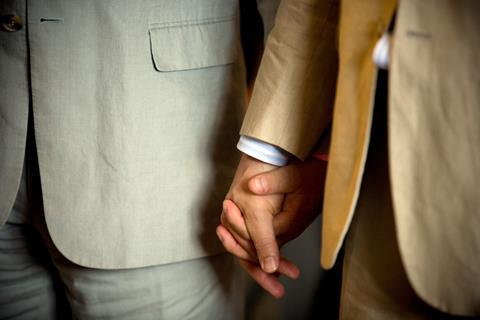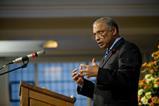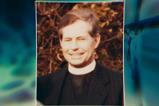The Church in Wales has become the latest denomination to change its rules on gay relationships. But what does it mean in practise, and what might be the future implications for relationships within the Anglican Communion?

This week, the Church in Wales’ governing body voted to allow same-sex couples to have their civil partnership or marriage formally blessed in a church building. The decision is the culmination of a lengthy process of debate within the Church. In 2015, the governing body – which is made up of the Church’s six bishops, 51 clerics and 86 lay delegates – voted in favour of allowing gay marriage in church. But because it did not meet the two-thirds majority required, nothing changed. But, after several bishops retired and were replaced, the mood of the leadership shifted. Three years ago, they spearheaded a motion in which the Church agreed it was “pastorally unsustainable” to not offer some kind of service for same-sex couples. This, in turn, led to the new law passed this week.
But what does it mean?
It remains the case that only one man and one woman can legally marry in a Church in Wales parish, but gay couples who have married elsewhere can now come for a service of blessing. According to a document explaining the change, the Church now states “the loving and faithful commitment of two persons of the same sex, aspiring to lifelong fidelity and mutual comfort, and who have made a commitment in civil partnership or marriage is worthy of acceptance by the Church.”
Individual vicars and priests will have to opt into using it and no-one will be forced to bless gay marriages against their will. The new provisions will be introduced for a trial period of five years.
The impact on unity
The Church in Wales is a small and often misunderstood denomination. Until 1920, its six dioceses and 900-odd parishes were part of the Church of England. As a result of the Welsh revival and accompanying rise of non-conformist chapels across the principality it was disestablished and spun out as an independent denomination. However, it retains its Anglican heritage and is a member of the global Anglican Communion, a family of related Churches around the world - mostly found in Commonwealth countries - who can trace their history back to C of E missionaries during the British Empire.
Although the members of the Communion are all legally independent bodies, clergy from each are able to move between the different Churches to minister. They share similar traditions and liturgies and all look to the Archbishop of Canterbury as their “first among equals”. In fact, former Archbishop of Canterbury, Most Rev Rowan Williams, came to that job after first working as Archbishop of Wales.
Therefore, the Welsh decision will have implications for its older and larger sister Church in England, which is in the midst of its own decade-long internal struggle over what to do about gay marriage. Advocates of liberalising its teaching can now point to Wales as a real-life example of how Anglicanism can welcome gay couples.
It was “pastorally unsustainable” to not offer some kind of service for same-sex couples
But the Church in Wales is not the first Anglican Church to make moves in this direction. It is in fact following in the footsteps of its sister denominations in America, Canada and Scotland, who have all gone a step further and allowed same-sex weddings in churches. This has caused huge friction with more conservative Anglican Churches elsewhere, especially in Africa and Asia. A furious backlash from their leaders forced Justin Welby to impose some limited sanctions on the pro-LGBT Churches (mostly barring them from some joint Anglican gatherings for a time).
It is unclear if the Welsh decision, which has not yet changed the actual doctrine of marriage, will draw a similar rebuke. But it will complicate the already-fractious relations within the Anglican Communion ahead of the once-a-decade Lambeth Conference next year, which will see every Anglican bishop from around the world meet in England. Some conservative African Churches have already said they will boycott the conference in protest at the presence of bishops, including some in gay marriages themselves, from the more liberal American and Canadian denominations.
The war within
The war within Anglicanism over LGBT issues has been simmering for more than 15 years and began when the American Church ordained an openly gay man as a bishop. This prompted the creation of the Gafcon movement, a grouping of the traditionalist wings of the Communion which has sponsored breakaway Anglican churches in North America for conservatives unable to tolerate their own denominations’ increasingly liberal views.
Fundamentally, however, English Anglicans tend not to focus on what is going on around the Communion and the eventual decision of the C of E – whether to keep its current rules which prohibit sexually-active gay relationships or instead change its doctrine – will be driven by the internal politics of the Church itself.
Some consider the direction of travel so overwhelming as to make the C of E’s ultimate decision a fait accompli. Since gay marriage was legalised in 2014, a string of denominations have, one by one, abandoned the traditionalist one-man-and-one-woman definition of marriage in various ways. The United Reformed Church changed its doctrine in 2016, followed by the Scottish Episcopal Church (SEC) a year later. Baptist ministers have been permitted to conduct gay weddings, although not enter one themselves. The Methodists introduced a second and parallel gender-neutral marriage definition this year, while the Church of Scotland seems to be on its way to some kind of liberalisation too.
Changing views
A growing number of Christians, including many famous evangelicals such as Oasis’s Steve Chalke and the former worship leader Vicky Beeching, have argued that believers have been misinterpreting the Bible for centuries and that actually God does not oppose faithful and loving same-sex relationships. At the same time, surveys show a long-term gradual decline among Christians who think sex between people of the same gender is wrong. In 1983, seven in ten Anglicans, and eight in ten other believers, told pollsters they opposed this. Thirty years later and those figures have fallen to around 35 per cent for each group. Among Anglicans, the percentage who believe same-sex marriage is wrong has dropped from 47 per cent in 2013 to 34 per cent last year.
But it’s important to note that, even within the Churches which have accepted gay marriage – which tended to be smaller and less evangelical in the first place – there are also many who continue to hold to a traditionalist position. Some quit the SEC in protest after it permitted gay marriage, and plans to form a new denomination, the Global Methodist Church, followed Methodist announcements in the US and UK earlier this year.
Ultimately, broader shifts in society are now having huge impact within the Church itself. Smaller and more liberal denominations, such as the Church in Wales, are the first to find it impossible to resist pressure from their clergy and members to ditch rules prohibiting gay marriage – rules which many now see as bigoted and unchristian. But larger and more evangelical denominations will face the same pressure soon.




































